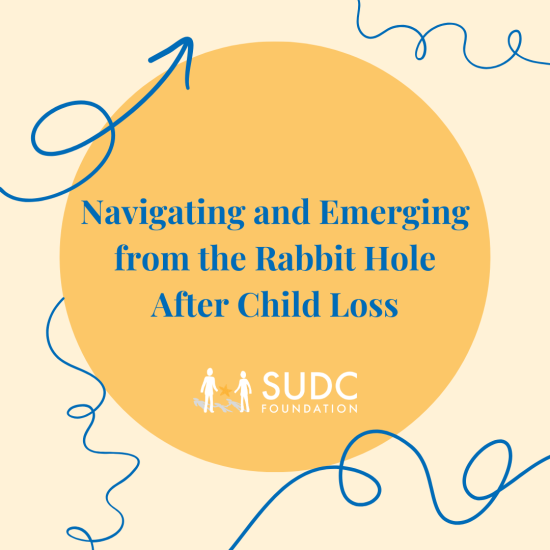02 Feb Navigating and Emerging from the Rabbit Hole After Child Loss

Embarking on the intricate journey of grief following the sudden loss of a child requires a gentle approach of understanding, self-care, and awareness to avoid the potential pitfalls of what we might refer to as the “rabbit hole.” This term describes a pattern of intense and overwhelming searches for answers, which, while initially a common response to trauma and loss, can lead to negative coping mechanisms and compromise overall well-being in the long term.
It’s important to recognize that falling into the rabbit hole, as we gently term it, can inadvertently foster negative coping patterns. The relentless pursuit of answers may temporarily distract from the pain but may also lead to heightened distress, emotional exhaustion, and a prolonged sense of unrest. While entirely normal after trauma and loss, embracing these patterns in the long term may hinder the healing process.
Amidst the vast amount of information available, it’s crucial to acknowledge that not all answers lie within the rabbit hole. Much of the information can be confusing and add to the overwhelming nature of grief. Speaking with professionals in the field can provide much-needed clarity. Consulting with experts and your primary care team is essential in calming fears that may otherwise lead you further down a path of uncertainty.
To foster a healing journey that nurtures your well-being, consider embracing the following gentle coping strategies:
Mindful Exploration:
Begin by gently exploring your emotions without judgment. Recognize that the pursuit of answers is a natural response to sudden child loss, and the intensity of emotions may lead to a search for meaning. Allow yourself the space to observe your feelings with compassion, fostering an understanding of your grief.
Self-Compassion and Gentle Self-Care:
Cultivate self-compassion by treating yourself kindly and engaging in self-care practices that resonate with your needs. Acknowledge that the rabbit hole, as we may colloquially term it, is a common response to trauma and loss. However, relying on this pattern for extended periods can lead to negative coping and compromise overall well-being, urging the importance of gentle self-care practices.
Connect with Supportive Spaces:
Seek solace in supportive environments, whether through counseling, group sessions, or community gatherings. Acknowledge that the rabbit hole syndrome, while initially a coping mechanism, may hinder your healing journey in the long term. Connect with others who share similar experiences to foster understanding and support within a warm, empathetic community.
Radical Acceptance of Emotions:
Embrace radical acceptance of your emotions, understanding that grief is multifaceted. Instead of getting caught in the rabbit hole of endless searches for answers, accept the range of emotions you’re experiencing. Acknowledge that the rabbit hole may provide temporary relief but emphasize the importance of gentle acceptance for sustained well-being.
Pause, Redirect, and Reflect:
Recognize moments when the rabbit hole syndrome starts affecting your well-being negatively. In these instances, gently practice the art of pausing. Take a breath, acknowledge your feelings, and intentionally redirect your focus towards activities or thoughts that bring comfort and positivity. Reflect on the impact of the rabbit hole on your overall well-being with kindness and understanding.
Focus on the Present Moment:
Ground yourself in the present moment through gentle mindfulness practices. This helps in avoiding the rabbit hole syndrome by redirecting your attention to the here and now. Understand that a constant search for answers, while understandable, may impede your ability to focus on gentle healing and self-care.
Embracing a gentle approach to navigating sudden child loss involves recognizing the potential negative impact of the rabbit hole syndrome and steering towards coping strategies that prioritize well-being. By fostering gentle understanding, self-compassion, and intentional redirection, you empower yourself to navigate grief with resilience and grace, avoiding the pitfalls that may hinder your healing journey. Seeking clarity from professionals in the field becomes an essential compass to navigate through the confusion and uncertainties, providing a pathway towards healing and peace.


